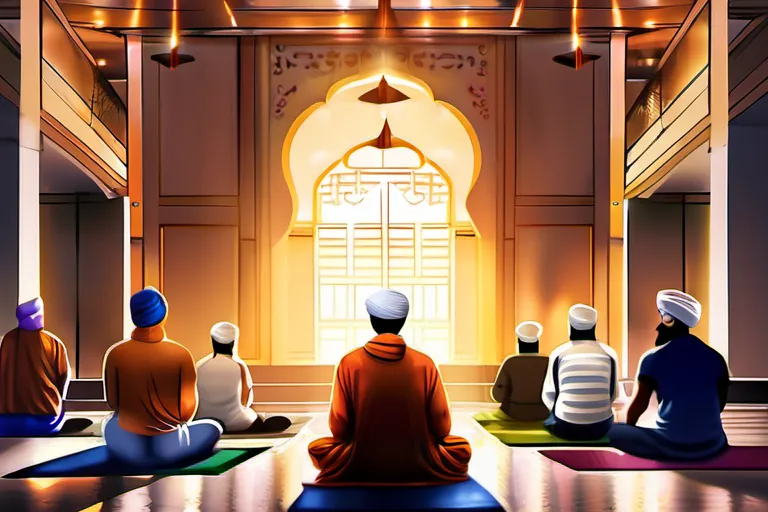Explore the teachings of Sikhism, focusing on spirituality, life, and the philosophy of Guru Nanak Dev Ji.
Guru Nanak Dev Ji, the founder of Sikhism, was a great spiritual teacher who imparted profound wisdom about life and spirituality. In this article, we delve into the teachings of Guru Nanak that guide Sikhs in their spiritual journey and daily lives.
The Life and Teachings of Guru Nanak
Imagine stepping into the vibrant world of Sikhism, where every teaching is woven like threads in a tapestry, each one adding depth and color to the rich fabric of spirituality. At the heart of this journey lies the life and teachings of Guru Nanak Dev Ji, the first Sikh guru who laid down the foundational principles that continue to guide millions today.
Guru Nanak Dev Ji was born in 1469 into a world grappling with religious conflicts and societal inequalities. His life was marked by a quest for truth, a journey that took him across vast distances, from India to Central Asia. Each step he took brought him closer to the core of human existence – the search for truth. Was his path unique? Or does it resonate with your own quest for meaning in life?
In exploring the teachings of Guru Nanak Dev Ji, we find a profound message about the interconnectedness of all beings. He emphasized that ‘there is no Hindu, there is no Muslim’; he taught that beyond religious labels lies the common humanity that binds us all. How often do you see people as different based on their beliefs or backgrounds? Could embracing this concept transform our interactions and societies?
The Guru’s teachings also highlight the importance of service. He believed in selfless service, ‘Do not seek to convert others; lead by example.’ This idea challenges us to think about how we can contribute positively to the world around us. Is your life a reflection of this principle? Can you find ways to serve others without seeking recognition?
Guru Nanak Dev Ji’s life and teachings also emphasize truthfulness and integrity. He believed in living with honesty, not just in words but in actions as well. How often do we say one thing and do another? Can you identify areas where you can be more truthful?
The legacy of Guru Nanak Dev Ji lives on through the Guru Granth Sahib, which contains his hymns and teachings. These verses continue to inspire millions, urging them to seek a higher purpose in life. Do these teachings resonate with your own spiritual or philosophical beliefs? Can you see how they might enrich your own path?
Reflecting on the life of Guru Nanak Dev Ji can be transformative. His teachings are not just historical anecdotes but timeless guidance for living a fulfilling and meaningful life. Are there any lessons from his life that you would like to incorporate into your daily existence? Can these teachings help you navigate the complexities of modern life with greater ease?
The Concept of Ik Onkar in Sikhism
The concept of Ik Onkar (One God) in Sikhism stands at the core of its spiritual philosophy, much like a cornerstone supports the foundation of a mighty edifice. How can we truly understand the depths of spirituality without delving into this fundamental belief? Ik Onkar is not just a statement; it’s an embodiment of unity and divinity.
Imagine walking through a dense forest where every tree, every leaf, every creature whispers the same truth: there is one supreme being. This one god is all-pervading, present in every form, yet beyond any form. How does this belief shape our understanding of life and spirituality?
In Sikhism, Ik Onkar signifies that God is everywhere—within us, outside us, in the highest heavens and in the deepest abysses. This concept challenges us to see the divine in all creation, from the tiniest insect to the vast expanse of space. If we truly embrace this belief, do we not become more compassionate towards every living being?
Ik Onkar also teaches us that our souls are part of this one divine essence. How can we view ourselves as separate entities when we are all connected to the same source? This interconnectedness fosters a sense of unity and brotherhood among Sikhs, encouraging them to treat everyone with respect and kindness.
The implications of Ik Onkar extend beyond just belief. It calls for a life lived in harmony with nature and with fellow human beings. Can we truly achieve spiritual peace while causing harm or injustice? The answer is a resounding no. When we align our actions with the teachings of Guru Nanak, we strive to live a life that reflects this unity and divinity.
So, how do we embrace Ik Onkar in our daily lives? Through sikhi, or the path of truth and devotion. This involves not just repeating mantras but understanding the deep meaning behind them. It’s about seeing God in every aspect of creation and treating all with reverence.
Ik Onkar is a profound concept that challenges us to question our beliefs, actions, and interactions with the world. It reminds us that true spirituality lies not in worshiping idols or performing rituals but in living a life that honors the one divine presence within everything.
As we explore further into the teachings of Guru Nanak, let’s remember this fundamental principle—Ik Onkar. May it guide us on our journey towards spiritual enlightenment and harmony with all beings.
The Role of Naam Simran in Sikh Spirituality
Imagine stepping into a garden where every flower represents a different aspect of spirituality, and the gardener is Guru Nanak Dev Ji. In this divine garden, one practice stands out like the golden lotus: Naam Simran, or the remembrance of God’s name. This practice is akin to whispering your soul’s deepest desires into the wind, knowing that every breath carries you closer to enlightenment.
Naam Simran is more than just a ritual; it is a way of life. By repeatedly chanting Nam, which means “name,” one becomes engrossed in the presence of the Divine. It’s like planting a seed and watching it grow, nourished by the constant reminder that you are not alone, but rather part of something much larger than yourself.
But why is Naam Simran so crucial? Isn’t just living a good life enough? Consider this: every flower in the garden needs sunlight to bloom fully. Similarly, our spiritual journey requires constant nourishment through the remembrance of God’s name. Without it, we risk withering away, just like leaves without water.
How do you begin this practice? It’s as simple and complex as breathing. You can start by setting aside a few moments each day to chant Nam, focusing on the vibrations of these syllables. Over time, it becomes second nature, much like how you don’t think about breathing until you have to.
Some might wonder if this practice is only for those who are initiated into the Sikh faith. The answer is a resounding no. Just as sunlight is free and accessible to all, Naam Simran is open to everyone. It’s a universal language that transcends barriers of religion, culture, or tradition.
Naam Simran is a thread that runs through the fabric of Sikh spirituality. It is not just about finding God but about living a life in harmony with Him. It’s like navigating a vast ocean and finding solace in the stars that guide you. By focusing on Naam Simran, one can achieve a state of inner peace and connect more deeply with the One Ik Onkar embodies.
So, why not give it a try? Just as Guru Nanak Dev Ji did, let your soul be nourished by the remembrance of God’s name. It might just be the key to unlocking deeper layers of spirituality and life itself.
The Importance of Service (Sewa) in Sikhism
Imagine a journey where every step you take, no matter how small, becomes a service to others—a way to honor God Himself. This is the heart of Sewa, the principle of selfless service in Sikhism that Guru Nanak Dev Ji deeply emphasized. How can something so simple be so transformative? It’s as if every act of kindness and compassion is like threading a golden thread, weaving through the fabric of your life to create a tapestry of love and devotion.
Sewa isn’t just about helping others; it’s about serving God in all that we do. When you clean a temple floor or volunteer at a community kitchen, you’re not just performing menial tasks—you’re engaging in a profound spiritual practice. Isn’t it intriguing to think that even the smallest act of service can be an expression of your devotion? Just like water from a river nourishes the land, Sewa nurtures the soul and strengthens our connection to Waheguru, the divine.
In Sikhism, every individual is seen as a reflection of God. Therefore, when you serve another person, you are serving God through them. This interconnectedness means that by performing Sewa, we recognize the unity in diversity and the infinite love that binds all beings. It’s like a symphony where each note resonates with the others, creating harmony that echoes across time and space.
The beauty of Sewa lies not just in its outward manifestations but also in the internal transformation it brings. When you practice Sewa regularly, it cultivates qualities such as humility, compassion, and selflessness within you. These virtues become integral parts of your character, making you a better person and a more compassionate member of society.
So, next time you find yourself compelled to help someone in need, remember that you are not just doing a favor—you are participating in a sacred act of worship. Sewa is not only a duty but a privilege, an opportunity to connect with the divine within every individual we encounter. In this way, each act of service becomes a step on the path to spiritual growth and enlightenment.
The Concept of Khalsa and Amrit Sanchaar
Imagine a gathering where thousands of Sikhs come together, their heads bowed, as they await the sacred Amrit Sanchaar ceremony. This ritual, often described as a divine initiation, is central to the concept of Khalsa, a term that encapsulates both an institution and a state of being for Sikhs. What does Guru Nanak’s religion teach us about this profound practice?
The Khalsa, initiated through Amrit Sanchaar, stands as a symbol of commitment and dedication to the path laid out by Guru Nanak Dev Ji. This ceremony involves the blessed water (Amrit) prepared in a ceremonial vessel called an kara, which holds both spiritual significance and practical symbolism. By partaking in this ritual, individuals pledge their lives to service, justice, and the pursuit of truth—core values that guide Sikh life.
Through Amrit Sanchaar, Sikhs are reminded of their duty towards humanity and the divine. The process is not just about receiving a physical blessing but embracing a lifelong journey of spiritual transformation and social responsibility. Each sip of Amrit signifies a promise to live a life dedicated to righteousness and compassion, mirroring the teachings of Guru Nanak on living in harmony with nature and society.
By delving into these ceremonies, one can truly grasp the depth of Sikh spirituality. The Khalsa is more than a social club or community; it’s an embodiment of the essence of Guru Nanak’s philosophy. It challenges us to ask: How can we live in such a way that our actions reflect the divine within us? Are we truly committed to making this world a better place, not just for ourselves but for all?
Living a Virtuous Life According to Guru Nanak’s Teachings
Imagine you’re walking through a bustling bazaar, surrounded by the sounds of haggling and the smells of spices. In this vibrant market of life, Guru Nanak Dev Ji teaches us to navigate with virtue. How do we find our way in such a chaotic world? By living according to his teachings on virtuous living.
Virtuous living, as taught by Guru Nanak, is like planting seeds that will grow into the robust trees of righteousness. These tenets emphasize honesty, compassion, and selflessness. Do you ever wonder why honesty is such a cornerstone? It’s because in every transaction, whether big or small, integrity ensures we treat others as we would wish to be treated.
Compassion, on the other hand, is like the gentle rain that nourishes life. Just as nature provides for all without discrimination, so too should we extend our kindness and understanding to every being. This teaches us not to judge or exclude anyone based on their station in life.
Selflessness, the third pillar, reminds us of the candle that lights itself but also illuminates others. When we serve with selflessness, we’re not just helping others; we’re lifting our own spirits and contributing to a greater good. It’s like pouring water from one cup into another—neither is diminished by the act, yet both are enriched.
Applying these teachings in daily life isn’t always easy, but it’s necessary. Consider your actions: Do they reflect honesty? Compassion? Selflessness? The journey of virtuous living is a constant reminder to question our motives and ensure that every choice we make aligns with the higher values taught by Guru Nanak Dev Ji.
Conclusion
 Guru Nanak’s teachings emphasize the importance of living a virtuous life, serving others, and seeking inner peace. By understanding these teachings, we can lead a more fulfilling and spiritually enriched life.
Guru Nanak’s teachings emphasize the importance of living a virtuous life, serving others, and seeking inner peace. By understanding these teachings, we can lead a more fulfilling and spiritually enriched life.











